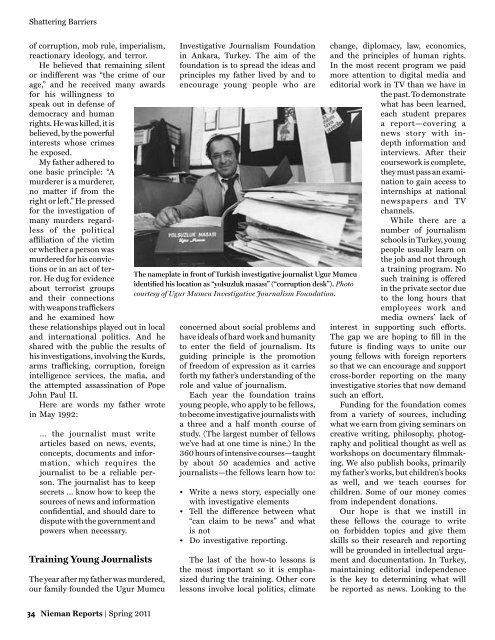N ieman Reports - Nieman Foundation - Harvard University
N ieman Reports - Nieman Foundation - Harvard University
N ieman Reports - Nieman Foundation - Harvard University
You also want an ePaper? Increase the reach of your titles
YUMPU automatically turns print PDFs into web optimized ePapers that Google loves.
Shattering Barriers<br />
of corruption, mob rule, imperialism,<br />
reactionary ideology, and terror.<br />
He believed that remaining silent<br />
or indifferent was “the crime of our<br />
age,” and he received many awards<br />
for his willingness to<br />
speak out in defense of<br />
democracy and human<br />
rights. He was killed, it is<br />
believed, by the powerful<br />
interests whose crimes<br />
he exposed.<br />
My father adhered to<br />
one basic principle: “A<br />
murderer is a murderer,<br />
no matter if from the<br />
right or left.” He pressed<br />
for the investigation of<br />
many murders regardless<br />
of the political<br />
affiliation of the victim<br />
or whether a person was<br />
murdered for his convictions<br />
or in an act of terror.<br />
He dug for evidence<br />
about terrorist groups<br />
and their connections<br />
with weapons traffickers<br />
and he examined how<br />
these relationships played out in local<br />
and international politics. And he<br />
shared with the public the results of<br />
his investigations, involving the Kurds,<br />
arms trafficking, corruption, foreign<br />
intelligence services, the mafia, and<br />
the attempted assassination of Pope<br />
John Paul II.<br />
Here are words my father wrote<br />
in May 1992:<br />
… the journalist must write<br />
articles based on news, events,<br />
concepts, documents and information,<br />
which requires the<br />
journalist to be a reliable person.<br />
The journalist has to keep<br />
secrets … know how to keep the<br />
sources of news and information<br />
confidential, and should dare to<br />
dispute with the government and<br />
powers when necessary.<br />
Training Young Journalists<br />
The year after my father was murdered,<br />
our family founded the Ugur Mumcu<br />
Investigative Journalism <strong>Foundation</strong><br />
in Ankara, Turkey. The aim of the<br />
foundation is to spread the ideas and<br />
principles my father lived by and to<br />
encourage young people who are<br />
The nameplate in front of Turkish investigative journalist Ugur Mumcu<br />
identified his location as “yolsuzluk masası” (“corruption desk”). Photo<br />
courtesy of Ugur Mumcu Investigative Journalism <strong>Foundation</strong>.<br />
concerned about social problems and<br />
have ideals of hard work and humanity<br />
to enter the field of journalism. Its<br />
guiding principle is the promotion<br />
of freedom of expression as it carries<br />
forth my father’s understanding of the<br />
role and value of journalism.<br />
Each year the foundation trains<br />
young people, who apply to be fellows,<br />
to become investigative journalists with<br />
a three and a half month course of<br />
study. (The largest number of fellows<br />
we’ve had at one time is nine.) In the<br />
360 hours of intensive courses—taught<br />
by about 50 academics and active<br />
journalists—the fellows learn how to:<br />
• Write a news story, especially one<br />
with investigative elements<br />
• Tell the difference between what<br />
“can claim to be news” and what<br />
is not<br />
• Do investigative reporting.<br />
The last of the how-to lessons is<br />
the most important so it is emphasized<br />
during the training. Other core<br />
lessons involve local politics, climate<br />
change, diplomacy, law, economics,<br />
and the principles of human rights.<br />
In the most recent program we paid<br />
more attention to digital media and<br />
editorial work in TV than we have in<br />
the past. To demonstrate<br />
what has been learned,<br />
each student prepares<br />
a report—covering a<br />
news story with indepth<br />
information and<br />
interviews. After their<br />
coursework is complete,<br />
they must pass an examination<br />
to gain access to<br />
internships at national<br />
newspapers and TV<br />
channels.<br />
While there are a<br />
number of journalism<br />
schools in Turkey, young<br />
people usually learn on<br />
the job and not through<br />
a training program. No<br />
such training is offered<br />
in the private sector due<br />
to the long hours that<br />
employees work and<br />
media owners’ lack of<br />
interest in supporting such efforts.<br />
The gap we are hoping to fill in the<br />
future is finding ways to unite our<br />
young fellows with foreign reporters<br />
so that we can encourage and support<br />
cross-border reporting on the many<br />
investigative stories that now demand<br />
such an effort.<br />
Funding for the foundation comes<br />
from a variety of sources, including<br />
what we earn from giving seminars on<br />
creative writing, philosophy, photography<br />
and political thought as well as<br />
workshops on documentary filmmaking.<br />
We also publish books, primarily<br />
my father’s works, but children’s books<br />
as well, and we teach courses for<br />
children. Some of our money comes<br />
from independent donations.<br />
Our hope is that we instill in<br />
these fellows the courage to write<br />
on forbidden topics and give them<br />
skills so their research and reporting<br />
will be grounded in intellectual argument<br />
and documentation. In Turkey,<br />
maintaining editorial independence<br />
is the key to determining what will<br />
be reported as news. Looking to the<br />
34 N<strong>ieman</strong> <strong>Reports</strong> | Spring 2011

















